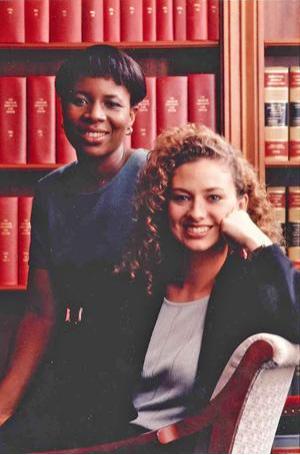US Activist Layli Miller-Muro Defends Immigrant Women

Layli Miller-Muro wasn't even out of law school before she helped litigate a case that revolutionized asylum law in the United States.
The case involved Fauziya Kassindja, a 17-year-old girl who fled the West African country of Togo to avoid a tribal practice known as female genital mutilation.
Miller-Muro sought asylum for Kassindja on the grounds that, if her client were to return to Africa, she would almost certainly be subjected to the painful and medically dangerous circumcision.
Legal precedent
After several set-backs, Miller-Muro finally won her case and in 1996, Kassindja was granted asylum by the U.S. Board of Immigration Appeals.
"As a result of this case that I helped litigate, which went all the way up to the highest immigration court in the United States, the legal doors opened to what we now call gender-based asylum law in the United States," says Miller-Muro.
Gender-based violence, she says, can be defined in a number of ways:
"Women may be facing gender-based violence if they're suffering domestic violence, if they are subject to human trafficking, or slavery, if they are facing an honor crime, or an honor killing."
After winning their case, Miller-Muro and Kassindja wrote a book about their experiences called "Do They Hear You When You Cry?" that was published in 1998. Miller-Muro used all of her portion of the proceeds from the book to start the Tahirih Justice Center, a non-profit organization that provides free legal services to women and girls fleeing human rights abuses from all over the world.
Named after a legendary women's rights advocate from the 19th century, the center has helped protect more than 10,000 women and girls from gender-based violence since its doors opened in 1997.
Creating the Tahirih Justice Center seemed like a natural progression for Miller-Muro, who grew up in the southern state of Georgia on the heels of the civil rights movement of the 1960s. Her parents were deeply involved in social justice issues. Her mother worked for the Martin Luther King, Jr. Center for Nonviolent Social Change and both her parents were active in the Baha'i religious community.
Baha'i values
The Baha'i faith, founded in Iran in 1844, is among the world's fastest-growing religions. Its central theme, says Miller-Muro, is unity.
"The Baha'i faith believes very strongly, as a matter of its theology, in the importance of justice. It believes strongly in the equality of women and men, in the elimination of racism, in the elimination of the extremes of wealth and poverty and other kinds of values that made us very involved in the community," she says.
Those values resonated with Miller-Muro, both in theory, and in practice, throughout her childhood during the 1970s and 1980s. She and her family often socialized with families of different faiths and from different socio-economic backgrounds.
"So for example," says Miller-Muro, "I would have slumber parties at public housing projects. And I grew up acutely aware of inequality in American society. I became very conscious of racism in particular, and I developed - quite early on - a real passion for trying to address issues of inequity and injustice."
That passion intensified during a pre-college trip to Africa, where she witnessed overt violence against women.
She had never intended to focus on women's issues, says Miller-Muro, but the Kassindja case set her on that fateful path.
"I would say that the story of my involvement in this issue, and in particular the creation of the Tahirih Justice Center, is less a story of deliberate intent than a story of a vague intent to be able to contribute in some way to justice, and then doors opening to make that possible."
Click here to read the full story:
By Julie Taboh
VOA News
Photo Credit:
Tahirih Justice Center